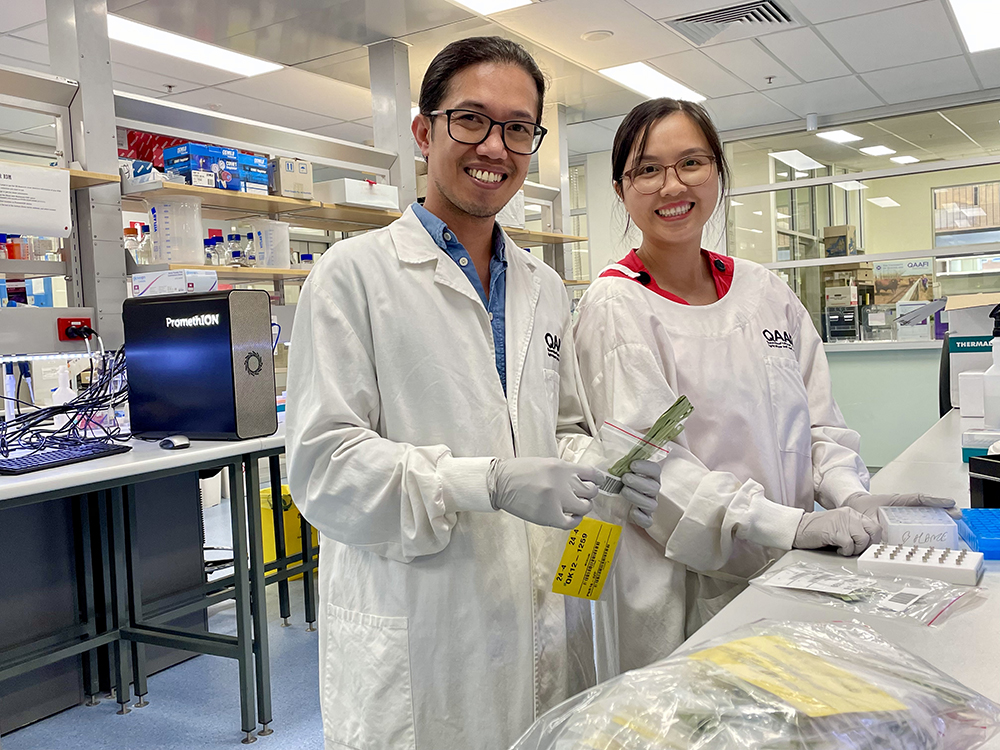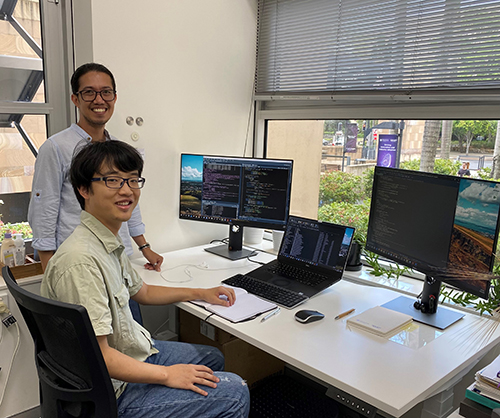Dr Eric Dinglasan got his first taste for sugarcane as a plant pathologist inspecting imported cane in post-entry quarantine in the Philippines. Many of the varieties came from Sugar Research Australia (SRA).
While he has since worked in plant diseases and on various crops, today Eric is a crop genetics researcher for the Queensland Alliance for Agriculture and Food Innovation (QAAFI), at The University of Queensland, and once again working on sugarcane.
Eric and colleagues at QAAFI recently applied for and received an SRA Sugar Industry Research Award to ‘take to the next level’ the work of Professor Ben Hayes and his current SRA-funded project - 2017/002 Implementing and validating genomic selection in SRA breeding programs to accelerate improvements in yield, commercial cane sugar and other key traits.
“Sugarcane is an extremely complex plant,” Eric said.
“Ben’s work in genomic selection in the past two decades has influenced plant breeding and it is exciting for us all to see this technology now being adopted in SRA’s sugarcane breeding program.
"This is the first time in Australia that genomic selection is being looked at as part of the entire breeding perspective.

“This means that from a large number of initial lines and crosses, breeders can now make early choices and predictions when it comes to ‘variety parents’.
“This will not only save time in the breeding process but add confidence about these initial parent crosses that they will lead to high performing progeny,” he said.
The implementation of genomic selection in SRA’s breeding program was estimated by UQ Researchers Voss-Fels and others in 2021 to have the potential to double the rate of genetic gain in SRA’s breeding program.
Eric explains that his work will leverage the results of the previous project and continue the working relationship with SRA to take Ben’s research findings to the next level.
“I’ll be working with Ben and PhD students, Seema Yadav and Chensong Chen over the next year to take what we know about genomic selection a step further,” he said.
“We recognise the challenges that the sugar industry is facing, for example, in predicting the consistency or robustness of performance across ratoon crops.
"With this research award, we are not restricted only to parent selection – we are now in a unique position to further expand our predictions in the SRA breeding program to estimate the robustness of yield across ratoon crops in different growing regions.
“Varieties that perform really well in the first ratoon do not always hold up in the second and third ratoon.
This project will allow selection for varieties that yield really well across all ratoon crops. This is termed ‘robustness of yield’.
“It is our hope that we will be able to predict with precision, clonal performance for robustness of yield and fibre and sugar, across ratoon crops.
“If we can do this we would hope that the release of varieties that had good performance in the first ratoon and poor performance in later ratoons, with an associated economic penalty, could be avoided and an improved yield achieved for growers.”
With extensive data provided by SRA researchers, Eric and colleagues will utilise machine learning in this project to develop genomic prediction models that can account for both additive and nonadditive genetic effects.
“We are currently looking at the performance of first ratoon crops and also evaluating if they will be robust throughout later ratoon stages,” Eric said.

“If we can successfully apply this technology to predict and evaluate the ratoon performance on the final assessment trial (FAT) of a chosen clone, (i.e. the last stage of what is normally a 12-year breeding program) we will be able to greatly reduce the breeding pipeline and contribute roles in fast tracking product development strategies and operational efficiency of the SRA breeding program.”
The dataset includes clones distributed across different selection stages and trials in the Burdekin, Central Region, Northern Region, Southern Regions, and Herbert, and in rainfed and irrigated environments.
“Much of the project work is done on the computer but I do hope that we will be able to get out into the field and talk to SRA’s breeders,” Eric said.
“This is research that is already transitioning into variety breeding programs and it’s important for us to understand how that is working.
"Our goal is to be able to improve efficiency of parent selection and ultimately predict best performing clones that will go on to be the best varieties possible.
“We are grateful for this unique opportunity to be able to continue our work with SRA and ensure the work is translatable to the entire Australian sugar industry,” Eric said.
Media: Dr Eric Dinglsan, e.dinglasan@uq.edu.au; QAAFI Media, qaaficomms@uq.edu.au, +61 (0)409 135651.
This article is republished with permission from Cane Matters, Autumn 2023, Sugar Research Australia.
The Queensland Alliance for Agriculture and Food Innovation is a research institute at The University of Queensland supported by the Queensland Government via the Queensland Department of Agriculture and Fisheries.
